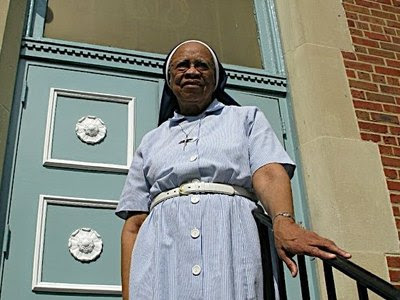 Here’s something unusual, and surprising: a profile of an order of nuns in the United States that is one of the few set up specifically for African-Americans:
Here’s something unusual, and surprising: a profile of an order of nuns in the United States that is one of the few set up specifically for African-Americans:
When Sister Georginah Githinji arrived in the U.S. from Kenya she thought of her trip as a miracle.
Githinji, a Kenyan Catholic nun, came to the States in 2004 to look for membership in a new congregation of sisters, or nuns. After visiting a group of Kenyan sisters who were already living in New York, Sister Githinji found the Franciscan Handmaids of the Most Pure Heart of Mary, an order of African-American nuns based in Harlem. Although Sister Githinji was a lifelong Catholic, who attended Mass daily back home, meeting the Franciscan Handmaids in the U.S. marked the first time that she had ever come across an order of sisters who happened to be African-American.
“I didn’t know that there were African-American sisters,” says Sr. Githinji, “I saw them for the first time in New York [and] I decided to join the Franciscans.”
Dr. M. Shawn Copeland, an associate Professor of Systemic Theology at Boston College, says that the Franciscan Handmaids of the Most Pure Heart of Mary is one of just three orders of African-American nuns here in the States. (In addition to the Franciscan Handmaids, there is also the Oblate Sisters of Providence in Baltimore, Maryland and the Sisters of the Holy Family in New Orleans, Louisiana.)
Nuns are sometimes classified by the manner of their respective vocations, which means essentially that they can be viewed (depending on the order or congregation) as either ‘cloistered’ or ‘apostolic’ sisters. Cloistered sisters devote their lives to prayer and contemplative lifestyles within convents or even monasteries. Most of the sisters that we see in public are usually identified as Apostolic nuns. They serve in various capacities as educators and as ministers participating in both spiritual and social charities. (Mother Theresa’s Sisters of Charity order of nuns serve as Apostolic sisters in a wide swath of countries throughout the world.)
Black nuns can be found throughout various Catholic sister congregations but the African-American orders outlined by Copeland were organized historically as a part of a response to racial and religious segregation in America.
According to the Franciscan Handmaids’ narrative, the order originally formed in Georgia in the early part of the 1900’s as a maneuver against legislation in the state at the time. The legislation on the table in Georgia in 1915 proposed a law designed to prohibit white Franciscan sisters from teaching black children.
Reverend Ignatius Lissner, a member of the Society of the African Missions (SMA), a 150 year-old Catholic French missionary organization, had been working to set up schools in Georgia for black children. Although the legislation never became actual law, Rev. Lissner received permission from the church to create an order of black nuns. In 1916, Elizabeth Barbara Williams, an African-American sister from Louisiana began working with Rev. Lissner to establish the order of the Handmaids of the Most Pure Heart of Mary. (Sister Williams became known as ‘Mother Theodore.’)
Within 10 years, The Handmaids moved north — to Harlem — to continue performing missionary work with African-Americans and Catholics. In Harlem, the Handmaids were originally charged with running a segregated nursery for working parents, particularly mothers who slept at work. The Handmaids also went on to work in additional ministries and education-based environments. In 1930, the Handmaids joined the Franciscan Order.
“The Catholic Church wouldn’t be Catholic if it wasn’t for us,” says Sister Loretta Theresa, a Harlem native and current administrative minister for the Franciscan Handmaids’ congregation. “I knew I was black, I knew I was Catholic…[W]hen the church was instituted it was made for all of us; my job is to be proud of both.”
Continue at the link for more.
PHOTO: Sister Loretta Theresa on the steps of The Franciscan Handmaids of the Most Pure Heart of Mary in Harlem, NY (Photo courtesy: Ceci Marquette)

